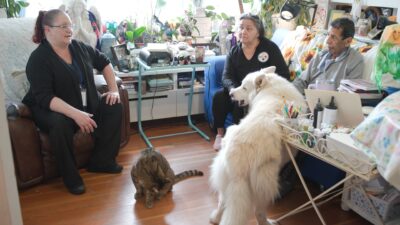Want to be a hospice volunteer?
Watch this video to discover what hospice volunteers experience and why they give their time to hospice patients and families.
Volunteer roles
Volunteering for hospice can be a rewarding and emotional experience. Hospice providers require a lot from their volunteers and value them greatly. Many volunteers say their service to hospice is gratifying, intellectually stimulating, and emotionally meaningful.
Hospice volunteers may provide:
- Companionship and human connection. Depending on the patient’s and family’s needs, volunteers may help by sitting and talking, reading aloud, taking walks, writing letters, listening to music, or supervising therapeutic visits with pets. Volunteers with the required certification may provide massage therapy, aromatherapy, or therapeutic touch. Bilingual volunteers can help by interpreting for patients who do not speak English.
- Respite and support for family members. Volunteers may assist with shopping or light household maintenance, or give family caregivers a chance to run errands or practice self-care. This may include babysitting, picking up children from school, or transporting them to club meetings or sporting events and practices. Volunteers also may help to care for a family pet.
- Bereavement program support. Volunteers may work closely with the hospice’s bereavement support staff. They might assist a support group facilitator, serve refreshments at a support group meeting, or help with mailings to families.
- Fundraising and administrative assistance. Volunteers with clerical skills can help with administrative duties in the hospice agency’s office. Fundraising responsibilities can range from preparing mailings or thank-you letters to organizing fundraising events and contacting potential donors.
- Special services. Notaries, barbers, and beauticians often volunteer their services, and volunteer musicians frequently perform at inpatient hospice facilities. Many hospices rely on volunteers for landscaping services and grounds maintenance.
Requirements
It is not uncommon for the loved ones of people who died in hospice to become interested in volunteering for a hospice provider. Most hospices require newly bereaved candidates to wait for a year after the death before volunteering with hospice patients.
Hospice providers typically require volunteers to:
- Submit to a background check, usually at the agency’s expense.
- Complete extensive training and orientation sessions to ensure they are equipped for the challenge of working with people who are dying.
- Have a valid driver’s license, particularly if they will be traveling to patients’ homes.
- Show evidence of vaccination or immunity to certain contagious diseases. This is required of all hospice team members who work directly with patients and families.
Most hospices require volunteers to be over the age of 18 or 21, but some have volunteer programs for high school students.
All-volunteer hospices
A few hospices are staffed entirely by volunteers. Typically, these are non-medical providers that offer practical and emotional support to patients with a terminal illness and their families.
Services may include housekeeping assistance, companionship, and transportation.
Patients do not receive medical care from these all-volunteer hospices. However, patients may choose to receive medical and social work services from a Medicare-certified hospice, or other types of care not specific to hospice.
Ready to volunteer?
If you’re interested in volunteering, a quick internet search will give you a list of hospice providers in your area. You can visit each hospice’s website to learn more about their volunteer programs.
Next, contact a hospice by email or phone and arrange to speak with the volunteer coordinator. Ask for details about the organization’s specific needs to see where your skills and interests would be a good fit.



